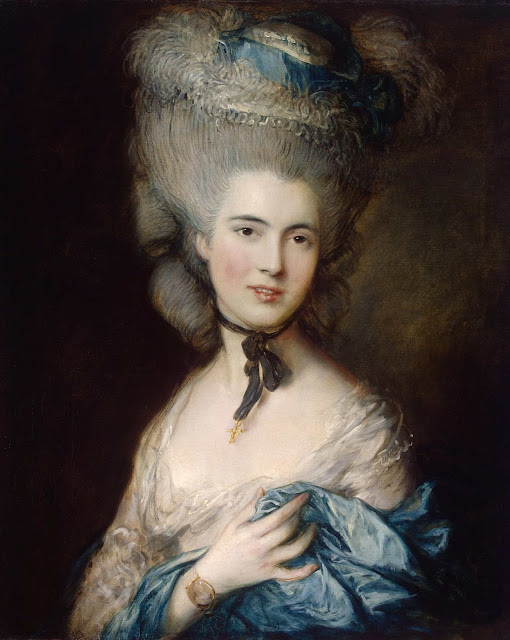 |
| David Luders Portrait of Ambassador P.G. Chernyshev with family ca. 1750 oil on canvas Hermitage, Saint Petersburg |
 |
| Thomas Gainsborough Woman in blue ca. 1775-85 oil on canvas Hermitage, Saint Petersburg |
"In the letters he sends to his friend, Werther recounts both the events of his life and the effects of his passion; but it is literature which governs the mixture. For if I keep a journal, we may doubt that this journal relates, strictly speaking, to events. The events of amorous life are so trivial that they gain access to writing only by an immense effort: one grows discouraged writing what, by being written, exposes its own platitude: "I ran into X, who was with Y" "Today X didn't call me" "X was in a bad mood," etc.: who would see a story in that? The infinitesimal event exists only in its huge reverberation: Journal of my reverberations (of my wounds, my joys, my interpretations, my rationalizations, my impulses): who would understand anything in that? Only the Other could write my love story, my novel."
 |
| Giovanni Pichler Cameo - Catherine the Great ca. 1760 onyx Hermitage, Saint Petersburg |
 |
| Allan Ramsay Portrait of David Hume 1766 oil on canvas National Portrait Gallery, Scotland |
 |
| Élisabeth Vigée Le Brun Self-portrait 1800 oil on canvas Hermitage, Saint Petersburg |
 |
| Élisabeth Vigée Le Brun Genius of Emperor Alexander I 1814 oil on canvas Hermitage, Saint Petersburg |
 |
| Élisabeth Vigée Le Brun Portrait of Count Grigory Chernyshev 1793 oil on canvas Hermitage, Saint Petersburg |
 |
| Élisabeth Vigée Le Brun Portrait of Countess Anna Stroganova and son ca. 1795-1801 oil on canvas Hermitage, Saint Petersburg |
"Shortly before falling love, Werther meets a young footman who tells him of his passion for a widow: "The image of that fidelity, that tenderness, pursues me everywhere, and as though scorched myself by that fire, I faint, I fail, consuming myself." After which there is nothing left for Werther to do but to fall in love in his turn, with Charlotte. And Charlotte herself will be pointed out to him, before he sees her; in the carriage taking them to the ball, an obliging friend tells him how lovely she is. The body which will be loved is in advance selected and manipulated by the lens, subjected to a kind of zoom effect which magnifies it, brings it closer, and leads the subject to press his nose to the glass: is it not the scintillating object which a skillful hand causes to shimmer before me and which will hypnotize me, capture me? This "affective contagion," this induction, proceeds from others, from the language, from books, from friends: no love is original."
 |
| Johann Bardou Portrait of Prince Ivan Golitsyn after 1788 pastel Hermitage, Saint Petersburg |
 |
| Anton Raphael Mengs Self-portrait 1774-75 pastel Hermitage, Saint Petersburg |
 |
| Jean-Baptiste Greuze Young woman in armchair 1765 drawing Hermitage, Saint Petersburg |
 |
| Jean-Baptiste Greuze Young woman in armchair 1765 drawing Hermitage, Saint Petersburg |
 |
| Jean-Baptiste Greuze Portrait of Countess Ekaterina Shuvalova ca. 1776-81 oil on canvas Hermitage, Saint Petersburg |
 |
| Josiah Wedgwood Portrait Medallion of George Washington 1779 jasperware Hermitage, Saint Petersburg |
Quoted passages are from A Lover's Discourse : Fragments by Roland Barthes, translated by Richard Howard (Hill & Wang, 1978)